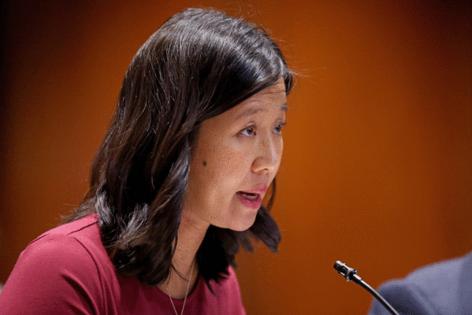Boston Mayor Wu's tax shift bill blocked again, this time in the Senate
Published in News & Features
BOSTON — Boston Mayor Michelle Wu’s controversial plan to raise commercial tax rates hit another snag on Beacon Hill Monday, when it was blocked by a member of the Senate, with the City Council’s annual tax-rate-setting hearing bearing down the next day.
While the mayor’s bid to shift more of the city’s tax burden from the residential to commercial sector — to fend off a 28% quarterly spike for homeowners — was delayed twice in the House by a Republican representative from Norwell, the procedural tactic was deployed in the Senate by a Boston Democrat, Sen. Nick Collins. He cited the need for concrete financial data prior to action being taken on the bill.
Collins said the city’s tax classification legislation came before the Senate without state Department of Revenue-certified information, which was only submitted to the body on the eve of Thanksgiving. “Complete” data, he said, would provide the body with an “accurate picture of what the budget challenges really are in Boston.”
“Most of this issue has been debated with hypothetical figures, as uncertified numbers have been varied,” Collins said Monday on the Senate floor. “Tomorrow the Boston City Council will have their annual tax classification hearing. It’s my hope that information will be made available to the Council and the public so we can get a full picture, and that the members of the Senate and constituents we serve get that as well, as we all deserve that.”
“Before action is taken on this matter,” he added, “I believe that this body should get access to the information the city and now state officials have access to.”
Collins’ move to postpone a vote on the matter automatically pushed further consideration of the legislation to the Senate’s next informal session, on Thursday, per Senate rules cited by Senate President pro tempore William Brownsberger.
The mayor’s bill had been brought to the floor Monday by Senate President Karen Spilka — a week after it was approved on a third try by the House of Representatives, where a procedural tactic to block a vote had been deployed on the first two occasions by state Rep. David DeCoste of Norwell.
DeCoste had raised concerns with how the plan would impact the economy, at a time when changing post-pandemic work patterns have led to vacant office space and falling commercial property values. He was absent for the third House session when his colleagues approved the legislation.
The same concerns were raised during Monday’s session by Susan Moran, Senate chair of the Joint Committee on Revenue, which held a hearing last month on the compromise legislation the mayor hammered out with four business stakeholders after a prior version of Wu’s tax plan stalled in the Senate.
“We’re all working hard to keep Massachusetts competitive, and there are concerns statewide that if Boston sets aside its residential-business tax balance, even temporarily, it will ripple through every community,” Moran, D-Plymouth and Barnstable, said on the Senate floor. “Boston’s commercial sector is essential not only to the city’s economic vitality, but to the state’s.”
Moran said property taxes fund more than 70% of Boston’s budgetary revenue, nearly two-thirds of which are paid by commercial and non-residential properties. Today’s influx of remote workers, the rise of empty office space, and slowing real estate development “are creating growing anxiety that the loss in equity for business owners could create a budget gap for the city that would necessitate raising residential taxes,” she said.
The mayor’s proposal seeks to “swing the load to businesses,” by petitioning Beacon Hill for a tax classification shift that would allow Boston to tax commercial properties beyond the 175% state limit, “but many are worried about the effects” of this plan, Moran said.
Moran said the three-year plan, if enacted, would be just a “temporary solution to what is realistically going to be a longer-term issue,” citing testimony from the head of a local think tank who said commercial values will continue to decline.
She also mentioned that tax assessment estimates the city presented in October showed a more “modest” tax increase on homeowners than the 33% the mayor initially predicted.
Those assessments showed the average single-family homeowner would likely face a 14% annual tax increase and 28% quarterly increase in January third-quarter bills with the legislation, compared to a 9% and 18% tax hike should the bill not pass.
Moran said circumstances have changed since the tax bill was first proposed by the mayor. She said there is now uncertainty around whether President Donald Trump’s new term will result in a loss of federal funding for Massachusetts.
Mayor Wu’s office did not immediately respond to a request for comment on the latest delay.
The Wu administration will present its tax-rate-setting proposal to the City Council on Tuesday, a hearing that will also explore revenue diversification with the aim of tackling Boston’s heavy reliance on property tax revenue.
Carolyn Villers, executive director of the Massachusetts Senior Action Council, a group that’s been advocating heavily for the bill and had a presence in the Senate chamber on Monday, told the Herald Sunday that it would provide a lifeline for many seniors.
“Many senior homeowners will be unable to afford the impending tax spike in Boston without sacrificing other needs such as money for heat and food,” Villers said. “The delays have added stress to stress and they are urging the Senate to act quickly, favorably.”
_____
©2024 MediaNews Group, Inc. Visit at bostonherald.com. Distributed by Tribune Content Agency, LLC.







Comments